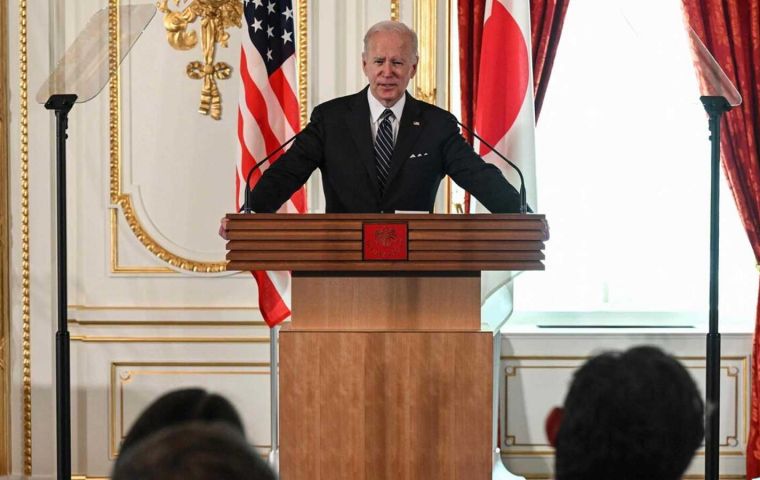MercoPress. South Atlantic News Agency
Biden on Asian tour amid growing military threats from China, N.Korea
 Biden vowed to lead the international community to achieve a free and open Indo-Pacific based on the rule of law
Biden vowed to lead the international community to achieve a free and open Indo-Pacific based on the rule of law US President Joseph Biden and Japanese Prime Minister Fumio Kishida met Monday at Tokyo's State House to discuss their two countries' joint deterrence and response capabilities in case of a military conflict involving China, which has sent dozens of warplanes into Taiwan's Air Defense Identification Zone in recent weeks.
“Japan and the United States, two nations that share fundamental values, will firmly lead the international community to achieve a free and open Indo-Pacific based on the rule of law,” the Asian prime minister said.
“The US-Japan alliance has long been the cornerstone of peace and prosperity in the Indo-Pacific, and the United States remains fully committed to Japan's defense, and we will meet the challenges today and in the future together,” Biden replied.
Kishida also welcomed the creation of the Indo-Pacific Economic Framework (IPEF), a new economic initiative led by Biden, and expressed Japan's intention to participate in it. US Security Adviser Jake Sullivan has confirmed Taiwan will not be part of the framework at launch.
The two leaders also affirmed that Tokyo and Washington will work together to achieve a world without nuclear weapons, a goal championed by Kishida. The prime minister's political turf is Hiroshima Prefecture, where the United States dropped an atomic bomb at the end of World War II.
During their meeting, Kishida told Biden that Japan plans to host the G7 Summit in Hiroshima next year. The choice of the city is apparently intended to build momentum toward abolishing nuclear weapons.
Both leaders also ratified their stance to expand sanctions against Russia and continue to support Ukraine. They also expressed concern over issues related to the China Sea and agreed that peace and stability in the Taiwan Strait are important amid increasing fears of a Chinese invasion since that country has vowed to retake the island it views as a wayward province.
“That's the commitment we made,” Biden said. “The idea that [Taiwan] can be taken by force ... it would dislocate the entire region and be another action similar to what happened in Ukraine,” Biden pointed out.
Under the One China policy, Washington recognizes Beijing's position that there is only one Chinese government and does not have diplomatic relations with Taipei. At the same time, the United States sells weapons to Taiwan under a 1979 law and stipulates threats to the island are “of grave concern to the United States.”
Biden is in Japan on the second leg of an Asia tour to boost economic and security ties with allies. He has already met in South Korea with President Yoon Suk-yeol, who is concerned over North Korea's missile and nuclear threats.




Top Comments
Disclaimer & comment rulesCommenting for this story is now closed.
If you have a Facebook account, become a fan and comment on our Facebook Page!